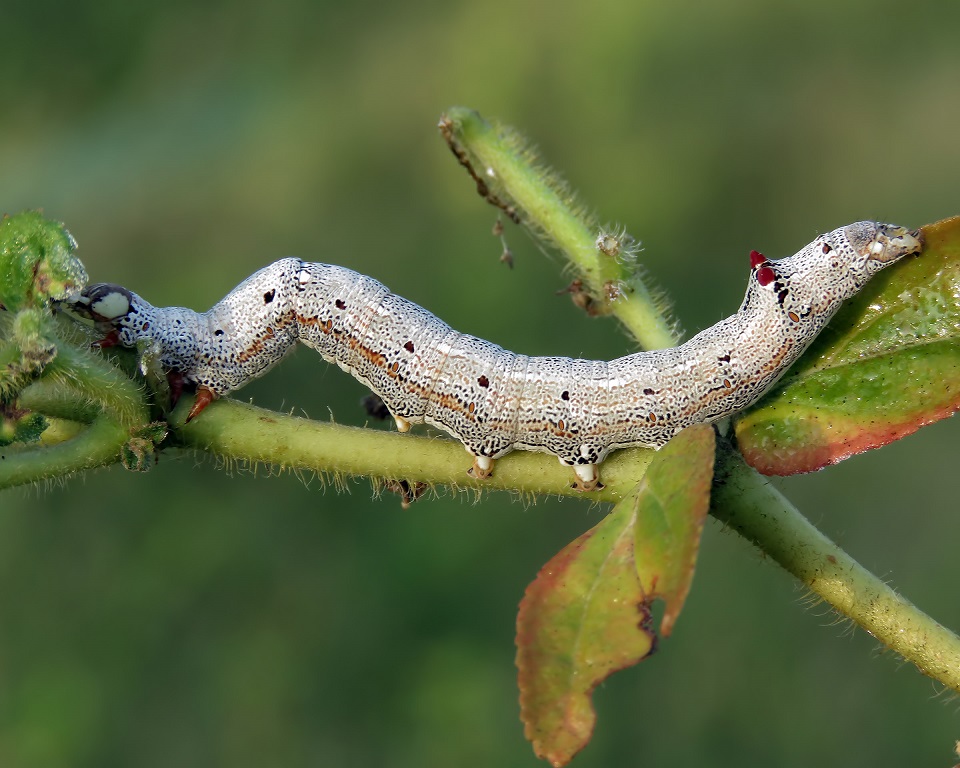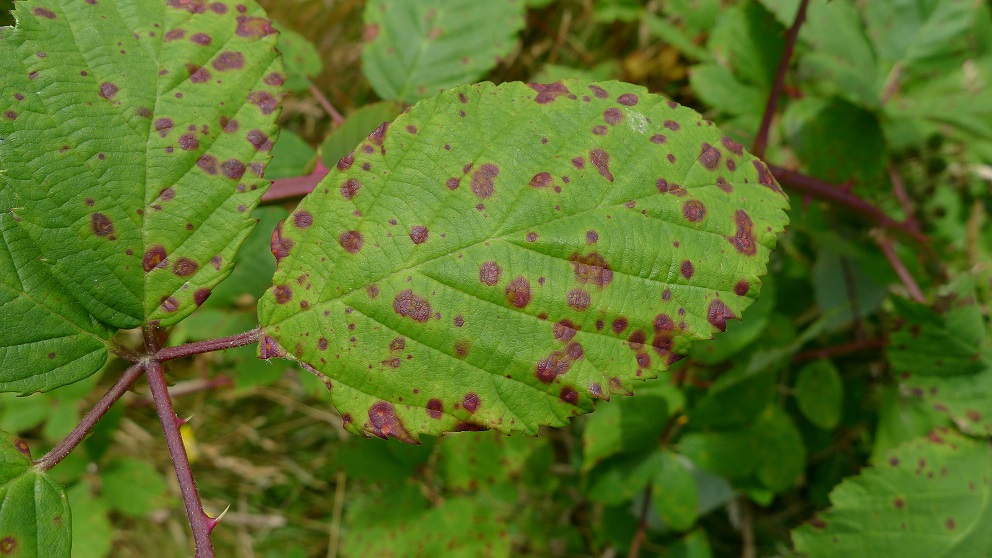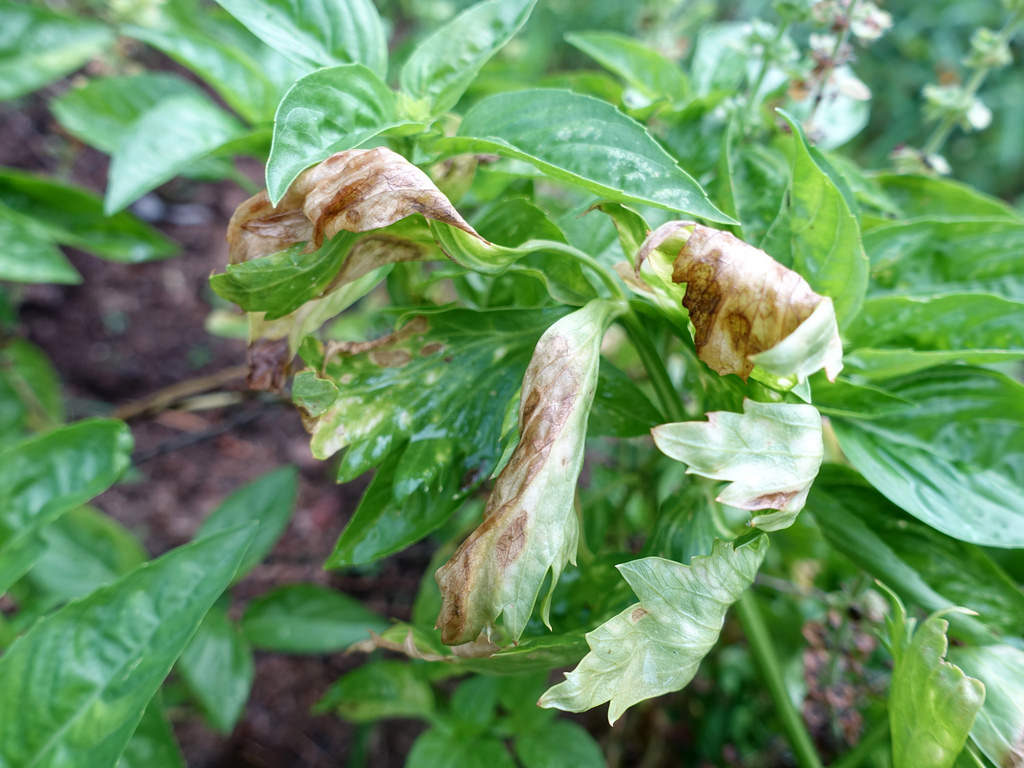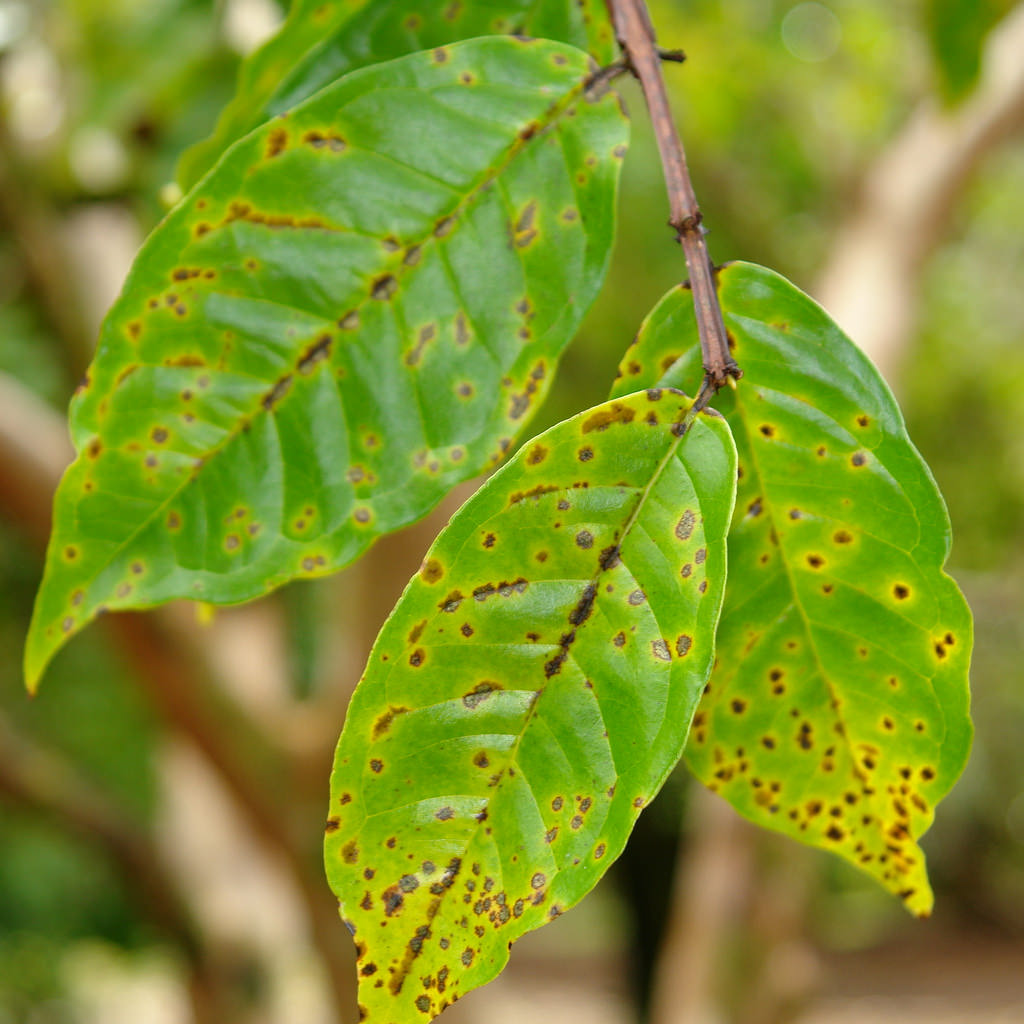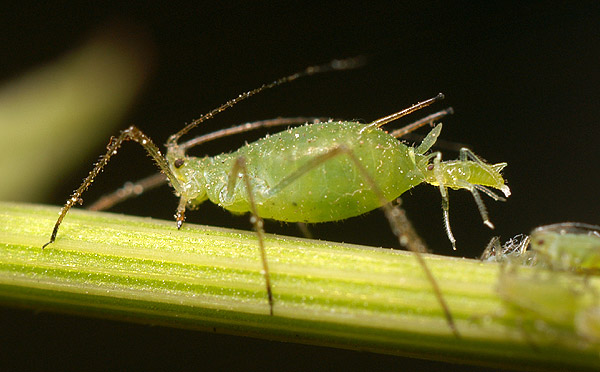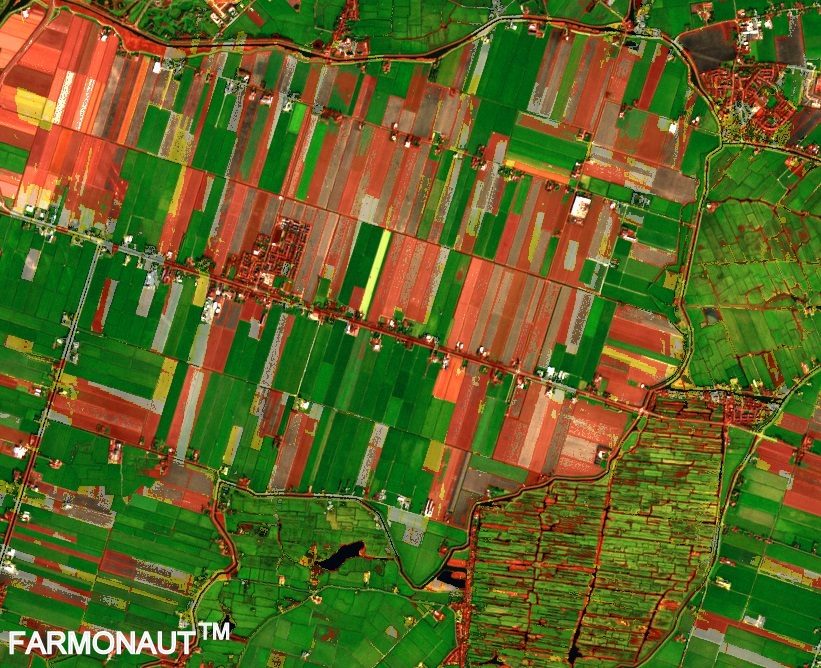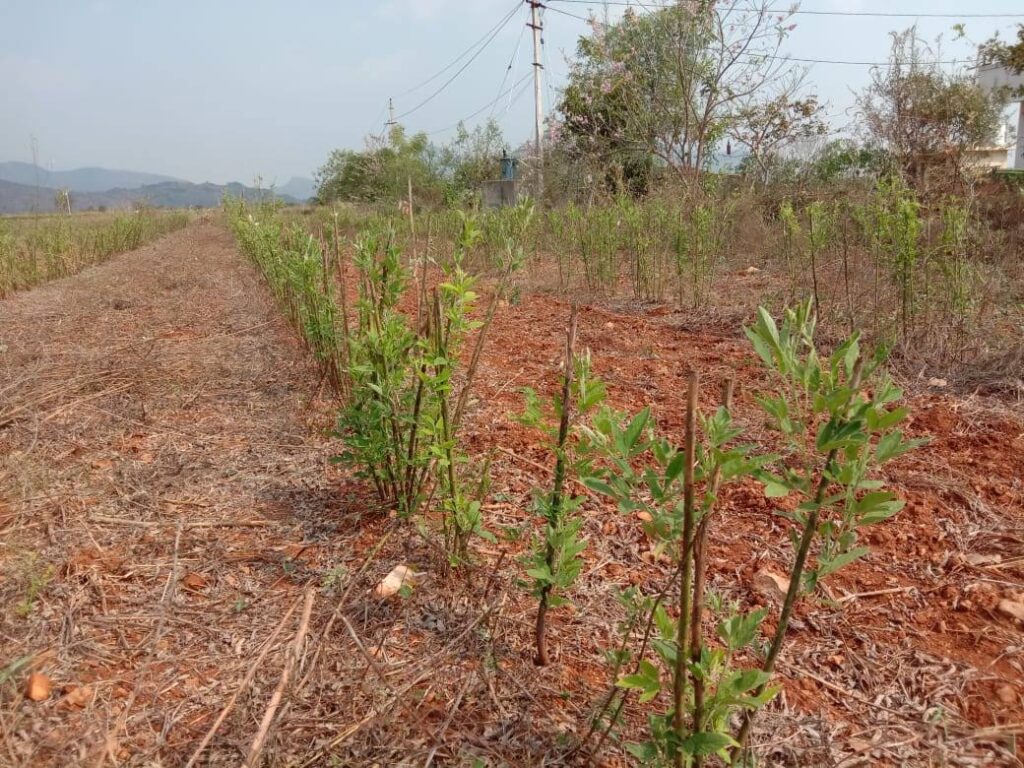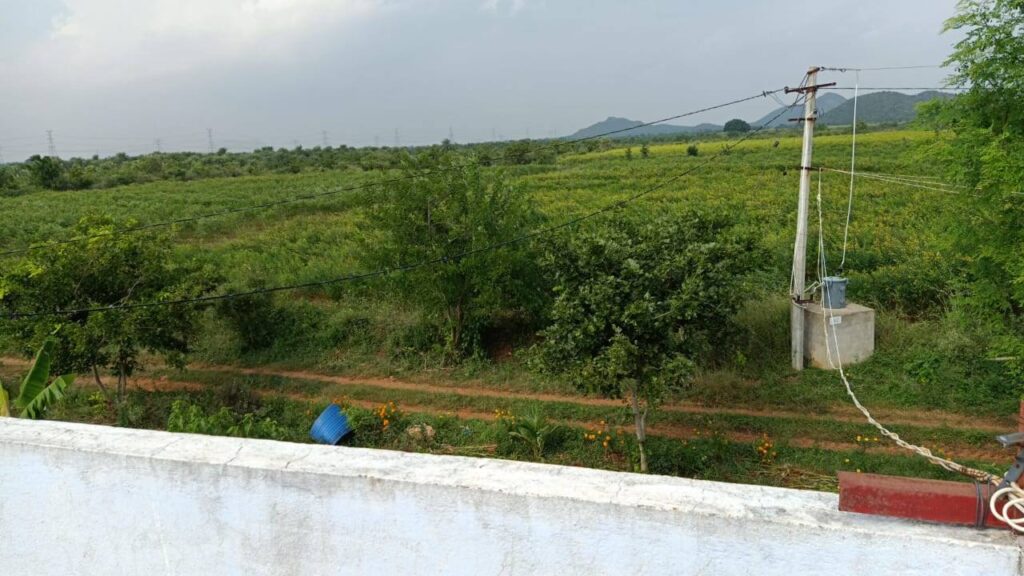Organic Pest Control: Farmonaut’s Guide to Sustainable Farming Solutions for Healthier Crops and Eco-Friendly Agriculture
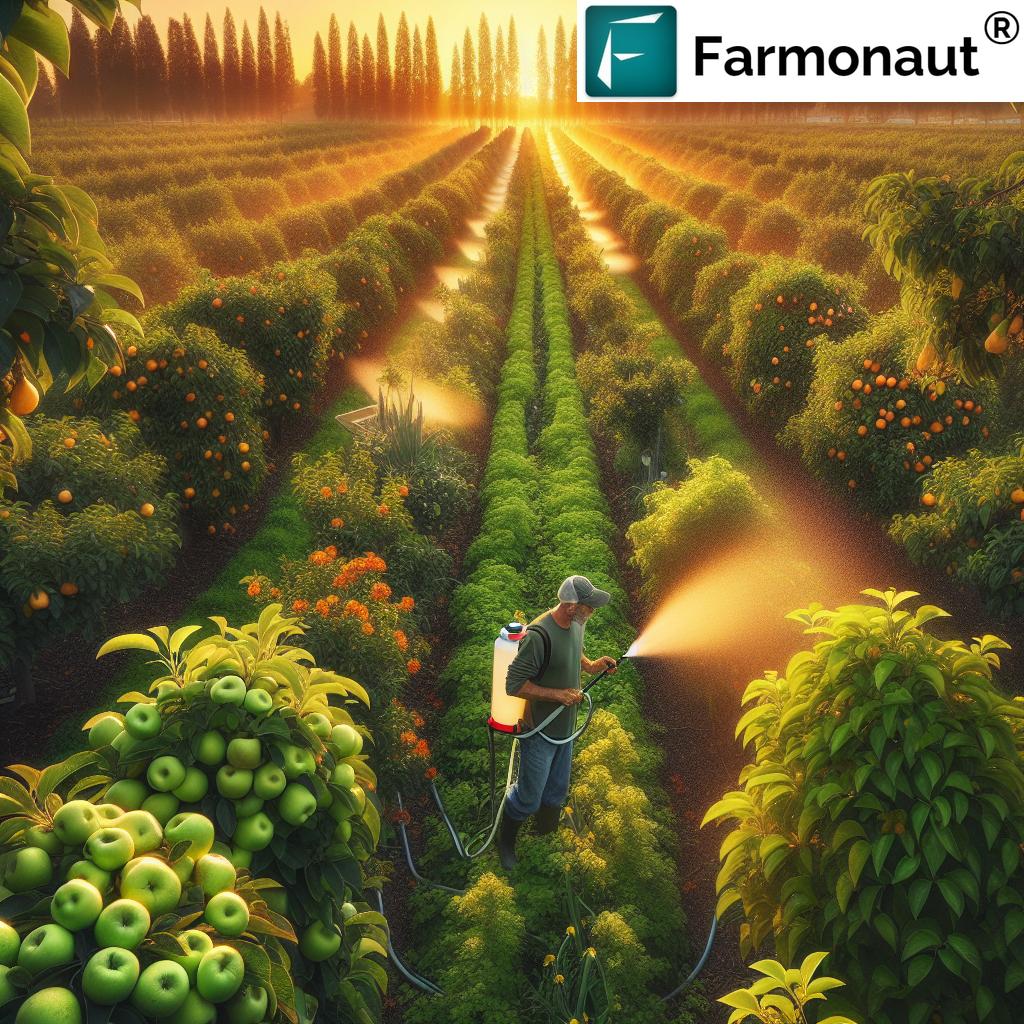
“Organic farming methods can reduce pesticide use by up to 97%, promoting healthier ecosystems and safer food production.”
Welcome to Farmonaut’s comprehensive guide on organic pest control and sustainable farming solutions. As advocates for eco-friendly agriculture, we are excited to share our expertise in natural insect repellents and environmentally friendly pesticides. In this blog post, we’ll explore a wide range of organic pest control methods that promote healthier crops without compromising the delicate balance of our ecosystem.
At Farmonaut, we understand the challenges farmers face in protecting their crops while maintaining sustainable practices. That’s why we’ve developed advanced satellite-based farm management solutions to support farmers in their journey towards organic and sustainable agriculture. Our technology integrates seamlessly with organic farming methods, providing real-time insights into crop health and pest management needs.
Explore our web app for comprehensive farm management tools:
Understanding Organic Pest Control
Organic pest control is an essential component of sustainable agriculture practices. It involves using natural methods and substances to manage pests, diseases, and weeds without relying on synthetic chemicals. This approach not only protects crops but also preserves soil health, biodiversity, and human well-being.
Let’s delve into some of the most effective organic pest control solutions that can be implemented across various crops:
1. Bio Neem Oil: Nature’s Powerful Insecticide
“Bio neem oil, a natural insecticide, can effectively control over 200 species of crop-damaging pests without harming beneficial insects.”
Bio neem oil is a versatile and potent organic pest control solution derived from the seeds of the neem tree. It’s particularly effective against a wide range of pests, including aphids, mealybugs, and whiteflies. Here’s how to use bio neem oil effectively:
- Mix 2-4 tablespoons of neem oil with 1 gallon of water
- Add a small amount of mild liquid soap to help the solution stick to plant surfaces
- Apply the mixture to plants using a sprayer, focusing on both the upper and lower leaf surfaces
- Repeat application every 7-14 days or after rain for optimal pest control
Bio neem oil is safe for use on various fruits, vegetables, and ornamental plants. It’s particularly effective for managing pests on crops like tomatoes, cucurbits, and citrus fruits.
2. Companion Planting: Natural Pest Repellents
Companion planting is an age-old organic farming technique that involves growing certain plants together to repel pests naturally. Some effective companion planting combinations include:
- Marigolds with tomatoes to repel nematodes
- Basil with peppers to deter aphids and spider mites
- Garlic with roses to protect against aphids and other insects
- Nasturtiums with cucurbits to trap aphids and whiteflies
This method not only helps in pest control but also enhances biodiversity and can improve crop yields.
3. Beneficial Insects: Nature’s Pest Control Agents
Encouraging beneficial insects is a crucial aspect of organic pest management. These natural predators help keep pest populations in check without the need for chemical interventions. Some beneficial insects to attract include:
- Ladybugs: Effective against aphids and mealybugs
- Lacewings: Control various soft-bodied insects
- Praying mantises: Generalist predators that eat a variety of pests
- Parasitic wasps: Target caterpillars and other larval pests
To attract these beneficial insects, plant a diverse range of flowering plants and herbs around your crops. This creates a welcoming habitat for these natural pest controllers.
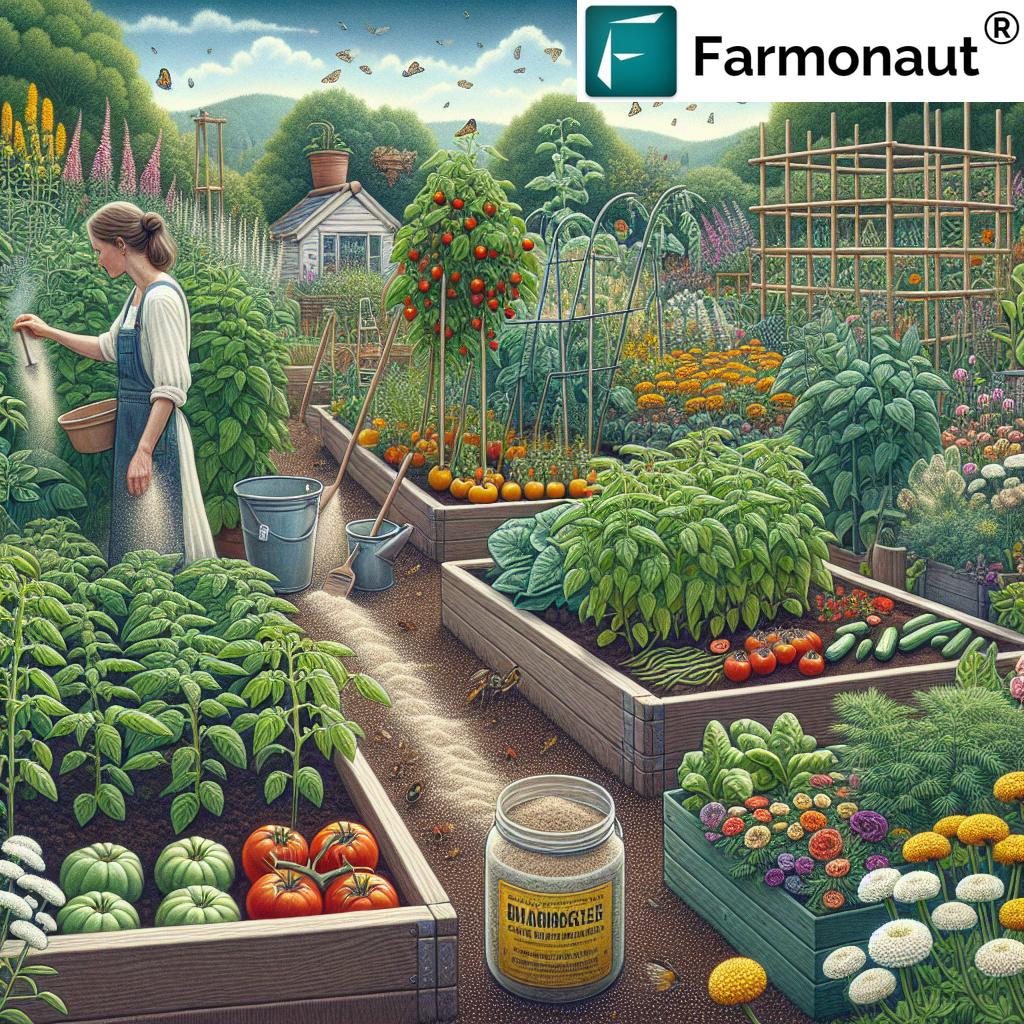
Advanced Organic Pest Control Techniques
As we dive deeper into organic pest control methods, it’s important to understand how technology can enhance these sustainable practices. At Farmonaut, we leverage satellite imagery and AI to provide farmers with real-time insights into crop health and potential pest issues. This technology complements organic pest control strategies by allowing for early detection and targeted interventions.
Discover how our satellite-based solutions can revolutionize your farming practices:
4. Microbial Pesticides: Harnessing Beneficial Microorganisms
Microbial pesticides are derived from naturally occurring microorganisms such as bacteria, fungi, and viruses. These organic solutions are highly effective against specific pests while being safe for beneficial insects and the environment. Some popular microbial pesticides include:
- Bacillus thuringiensis (Bt): Effective against caterpillars and certain beetle larvae
- Beauveria bassiana: Controls a wide range of insects, including whiteflies and thrips
- Trichoderma: Helps manage soil-borne diseases in various crops
When using microbial pesticides, it’s crucial to follow application instructions carefully and consider environmental conditions for optimal effectiveness.
5. Pheromone Traps: Disrupting Pest Mating Cycles
Pheromone traps use synthetic versions of insect pheromones to disrupt mating cycles and reduce pest populations. These traps are particularly effective for managing pests in orchards, vineyards, and vegetable crops. Some common applications include:
- Codling moth traps in apple orchards
- Mediterranean fruit fly traps in citrus groves
- Tomato pinworm traps in tomato fields
Pheromone traps are an excellent tool for monitoring pest populations and timing other control measures effectively.
6. Physical Barriers: Protecting Crops from Pests
Physical barriers are a simple yet effective method of organic pest control. They work by preventing pests from reaching the crops in the first place. Some effective physical barrier methods include:
- Row covers: Lightweight fabric covers that protect crops from flying insects
- Copper tape: Creates a barrier that slugs and snails won’t cross
- Mulching: Helps suppress weeds and can deter certain soil-dwelling pests
- Netting: Protects fruit trees and berry bushes from birds and larger pests
These methods are particularly useful for protecting vegetables, berries, and young fruit trees from common pests.
Enhance your organic farming practices with our mobile apps:
Crop-Specific Organic Pest Control Strategies
Different crops face unique pest challenges, requiring tailored organic pest control approaches. Let’s explore some crop-specific strategies:
Fruit Crops (Apples, Pears, Peaches, Citrus)
Fruit crops are often susceptible to a variety of pests and diseases. Here are some organic control methods:
- Kaolin clay sprays: Create a protective barrier against insects and sunburn
- Pruning: Proper pruning improves air circulation, reducing fungal diseases
- Fruit bagging: Protects individual fruits from insects and birds
- Trellising: Keeps fruit off the ground, reducing soil-borne diseases
Vegetables (Tomatoes, Cucurbits, Lettuce, Onions, Potatoes)
Vegetable crops often face challenges from various pests and diseases. Here are some organic solutions:
- Crop rotation: Prevents the buildup of soil-borne pests and diseases
- Intercropping: Planting aromatic herbs like basil and marigolds among vegetables
- Diatomaceous earth: A natural powder that deters crawling insects
- Baking soda sprays: Effective against powdery mildew on cucurbits
Grains (Wheat, Maize, Beans)
Grain crops require specific pest management strategies:
- Cover cropping: Planting cover crops between seasons to suppress weeds and improve soil health
- Beneficial nematodes: To control soil-dwelling pests
- Trap crops: Planting attractive crops around the main crop to divert pests
- Timely harvesting: Reduces post-harvest losses due to storage pests
Innovative Organic Disease Management Strategies
Disease management is a crucial aspect of organic farming. Here are some innovative strategies to keep your crops healthy:
1. Biocontrol Agents
Biocontrol agents are living organisms that can help manage plant diseases. Some effective biocontrol agents include:
- Trichoderma species: Effective against various soil-borne pathogens
- Bacillus subtilis: Controls a range of bacterial and fungal diseases
- Pseudomonas fluorescens: Promotes plant growth and suppresses pathogens
2. Plant Extracts and Botanical Preparations
Many plant-based preparations have natural fungicidal and bactericidal properties:
- Garlic extract: Effective against powdery mildew and certain bacterial diseases
- Neem leaf extract: Has broad-spectrum antifungal properties
- Compost tea: Rich in beneficial microorganisms that suppress plant pathogens
3. Cultural Practices for Disease Prevention
Implementing proper cultural practices is key to preventing diseases in organic farming:
- Proper spacing: Ensures good air circulation, reducing fungal diseases
- Sanitation: Removing infected plant material to prevent disease spread
- Water management: Avoiding overhead irrigation to reduce leaf wetness
- Resistant varieties: Choosing plant varieties bred for disease resistance
Leverage our API for advanced crop health monitoring:
Sustainable Pest Management for Specialty Crops
Specialty crops like berries, hops, and ornamentals often require unique pest management approaches. Let’s explore some sustainable solutions for these crops:
Berries (Strawberries, Grapes)
Berry crops are susceptible to various pests and diseases. Here are some organic control methods:
- Mulching with straw: Prevents soil splashing and reduces fungal diseases
- Bird netting: Protects ripening fruit from bird damage
- Beneficial mites: Help control spider mites in strawberries and grapes
- Sulfur dusting: Organic fungicide effective against powdery mildew in grapes
Hops
Hops cultivation faces unique challenges in organic pest management:
- Predatory mites: Effective against two-spotted spider mites
- Pruning and training: Improves air circulation, reducing downy mildew risk
- Copper-based fungicides: Organic option for controlling downy mildew
- Cover cropping: Helps suppress weeds and improve soil health
Ornamentals and Flowers
Ornamental plants and flowers require special attention in organic pest control:
- Insecticidal soaps: Effective against soft-bodied insects like aphids and mealybugs
- Beneficial nematodes: Control soil-dwelling pests in flower beds
- Neem oil: Broad-spectrum pest control for various ornamental plants
- Companion planting: Using pest-repelling plants in ornamental gardens
Advanced Techniques in Organic Nematode Control
Nematodes can be a significant challenge in organic farming. Here are some advanced techniques for managing these microscopic pests:
1. Biofumigation
Biofumigation involves incorporating specific plants, typically from the Brassicaceae family, into the soil. These plants release natural compounds that suppress nematode populations:
- Mustard: Releases isothiocyanates, which are toxic to many nematode species
- Radish: Some varieties have strong nematode-suppressing properties
- Rapeseed: Can be used as a green manure crop for nematode control
2. Soil Solarization
Soil solarization is an effective method for reducing nematode populations in warm climates:
- Cover the soil with clear plastic for 4-6 weeks during the hottest part of the year
- The heat generated kills nematodes and other soil-borne pests
- Most effective in areas with high summer temperatures
3. Nematode-Suppressive Crops
Certain crops have natural nematode-suppressing properties:
- Marigolds: Produce compounds toxic to many nematode species
- Sunn hemp: A legume that suppresses root-knot nematodes
- African marigold: Particularly effective against root-lesion nematodes
Integrating Technology in Organic Pest Management
At Farmonaut, we believe in harnessing the power of technology to enhance organic pest management strategies. Our satellite-based crop monitoring system provides valuable insights that can be integrated into organic farming practices:
- Early detection of pest infestations through vegetation health analysis
- Precise monitoring of soil moisture levels to prevent conditions favorable for pests
- Customized recommendations for organic pest control based on crop health data
- Tracking the effectiveness of organic pest control methods over time
Organic Pest Control Methods Comparison
| Pest Control Method | Target Pests | Suitable Crops | Application Method | Effectiveness Rating (1-5) | Environmental Impact | Cost Efficiency (1-5) |
|---|---|---|---|---|---|---|
| Bio Neem Oil | Aphids, Mealybugs, Whiteflies | Vegetables, Fruits, Ornamentals | Spray | 4 | Low | 4 |
| Beneficial Insects | Various pests | All crops | Release in field | 3 | Low | 3 |
| Companion Planting | Various pests | Vegetables, Herbs | Planting strategy | 3 | Low | 5 |
| Pheromone Traps | Specific insect species | Fruits, Vegetables | Trap placement | 4 | Low | 3 |
| Microbial Pesticides | Various pests and diseases | All crops | Spray or soil application | 4 | Low | 3 |
| Physical Barriers | Various pests | Vegetables, Small Fruits | Installation | 4 | Low | 4 |
| Natural Predators | Various pests | All crops | Habitat creation | 3 | Low | 4 |
Implementing Organic Pest Control Programs
Successful organic pest control requires a holistic approach. Here are key steps to implement an effective organic pest management program:
- Regular Monitoring: Use Farmonaut’s satellite-based monitoring to detect pest issues early.
- Identification: Accurately identify pests and beneficial insects.
- Threshold Establishment: Determine acceptable pest levels before intervention.
- Integrated Approach: Combine multiple organic control methods for best results.
- Record Keeping: Document pest occurrences, treatments, and outcomes.
- Continuous Learning: Stay informed about new organic pest control methods and technologies.
The Future of Organic Pest Control
As we look to the future, organic pest control is set to evolve with technological advancements and new scientific discoveries. At Farmonaut, we’re committed to being at the forefront of these developments:
- AI-driven pest prediction models for proactive management
- Precision application of organic pesticides using drones
- Development of new, more effective biopesticides
- Integration of IoT devices for real-time pest monitoring
Conclusion
Organic pest control is a crucial component of sustainable agriculture, promoting healthier crops and a more balanced ecosystem. By integrating natural methods, innovative technologies, and Farmonaut’s advanced satellite-based monitoring, farmers can effectively manage pests while minimizing environmental impact.
We encourage farmers to explore these organic pest control solutions and leverage Farmonaut’s technology to enhance their sustainable farming practices. Together, we can create a more resilient and eco-friendly agricultural future.
Frequently Asked Questions (FAQs)
- Q: How effective are organic pest control methods compared to conventional pesticides?
A: Organic pest control methods can be highly effective when implemented correctly. While they may work more slowly than synthetic pesticides, they offer long-term sustainability and preserve beneficial insects. - Q: Can I use organic pest control methods in large-scale commercial farming?
A: Yes, many organic pest control methods are scalable and can be implemented in commercial farming operations. Farmonaut’s technology can help manage these methods efficiently on a large scale. - Q: How does Farmonaut’s satellite technology assist in organic pest control?
A: Our satellite technology provides real-time crop health monitoring, enabling early detection of pest issues and allowing for timely, targeted organic interventions. - Q: Are organic pesticides completely safe for the environment?
A: While generally safer than synthetic pesticides, organic pesticides should still be used judiciously. They are designed to have minimal environmental impact but can affect non-target organisms if overused. - Q: How long does it take to see results from organic pest control methods?
A: Results can vary depending on the method and pest. Some techniques, like physical barriers, work immediately, while others, such as building beneficial insect populations, may take weeks or months to show full effectiveness.
For more information on how Farmonaut can support your organic farming practices, explore our subscription options:
Join us in revolutionizing agriculture through sustainable, organic practices and cutting-edge technology. Together, we can create a healthier, more productive future for farming.





